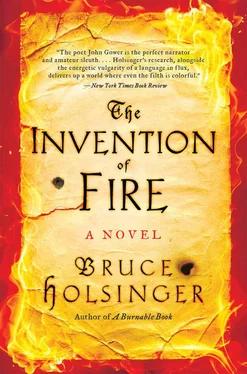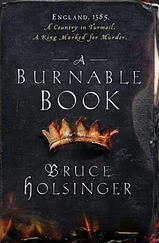Bruce Holsinger - The Invention of Fire
Здесь есть возможность читать онлайн «Bruce Holsinger - The Invention of Fire» — ознакомительный отрывок электронной книги совершенно бесплатно, а после прочтения отрывка купить полную версию. В некоторых случаях можно слушать аудио, скачать через торрент в формате fb2 и присутствует краткое содержание. Год выпуска: 2015, Издательство: HarperCollins, Жанр: Исторический детектив, на английском языке. Описание произведения, (предисловие) а так же отзывы посетителей доступны на портале библиотеки ЛибКат.
- Название:The Invention of Fire
- Автор:
- Издательство:HarperCollins
- Жанр:
- Год:2015
- ISBN:нет данных
- Рейтинг книги:3 / 5. Голосов: 1
-
Избранное:Добавить в избранное
- Отзывы:
-
Ваша оценка:
- 60
- 1
- 2
- 3
- 4
- 5
The Invention of Fire: краткое содержание, описание и аннотация
Предлагаем к чтению аннотацию, описание, краткое содержание или предисловие (зависит от того, что написал сам автор книги «The Invention of Fire»). Если вы не нашли необходимую информацию о книге — напишите в комментариях, мы постараемся отыскать её.
The Invention of Fire — читать онлайн ознакомительный отрывок
Ниже представлен текст книги, разбитый по страницам. Система сохранения места последней прочитанной страницы, позволяет с удобством читать онлайн бесплатно книгу «The Invention of Fire», без необходимости каждый раз заново искать на чём Вы остановились. Поставьте закладку, и сможете в любой момент перейти на страницу, на которой закончили чтение.
Интервал:
Закладка:
“You’ll need to restore him to the streets first,” she said with a huff. “He sits in sanctuary presently, over at Staining.”
“He is no longer there, mistress.”
Her brow went up again, the surprise genuine this time.
“Marsh has left sanctuary,” I told her. “He has been taken into the Tower.”
Her exhalation was long and slow, her eyes losing something of their fierce glint.
I brought out the serpentine device. “Mistress, is this familiar to you?”
She stared at it. “Where did you come across that?”
“It was given to me in Calais. You know what it is?”
“It’s a bit of a gun, isn’t it? Stephen made it, and several like it, here in the smithy.” She nodded toward a far corner of the yard. “Just there.”
“With your knowledge?”
She scoffed. “Smithed it at night, and under my very nose. Wouldn’t have had such a thing at Stone’s if the master were alive.”
“And Stephen used one of these snake guns to commit a crime. A murder.”
“So the beadle says.”
“You don’t believe it?”
Suddenly her attitude changed, and her face shone with sincerity. “Not a murder, I’ll be bound. He was out north of the walls, testing his guns. She came upon him and he killed her with the thing. An accident’s what it was, so he says.” Another test. She straightened her back. “I believe him. Spite of his night games and his slinking I do believe him, not that the Guildhall will.”
“Yet he took sanctuary at Staining.”
“Aye he did. My notion, and I put him there myself. Had no choice. He’d killed a girl, hid her body in his fright. Who’d believe his account of the thing after that, I ask you?”
“You saved him, then, didn’t you? From the law. From a probable hanging.”
“For now, at the least,” she said with a firm nod. “Stephen Marsh is no murderer, whatever the constables might claim. He’s not a warm soul, always distant from those around him, but there is a God’s measure of good in him. I sense it, have seen it. It was an accident, that girl’s death.”
“I believe this entire affair is an accident of sorts, Mistress Stone.” Her eyes narrowed. “Stephen has become involved in a series of events beyond his ken and well above his head. He is a pawn in an ugly war between factions, with his craft sacrificed to the cause of men who wish him no good.”
“And you wish him well, do you, sire?”
“I wish him nothing. Yet I may be able to help him. And thus help you.” A plan was forming quickly in my mind. For weeks I had been ruefully aware that I possessed no avenue into the Tower of London, no leverage of any sort with the royal armory at the foul center of this murderous business. Now, in this widow’s palpable trust in the goodness of her captive guildsman, this peculiar mix of devotion and dependence she felt toward Stephen Marsh, I saw a way.
“Help me?” she said with a skeptical look. “Why on Noah’s slaving back would you want to help a widow such as myself?”
I looked around the foundry, then back at its owner. “Mistress Stone,” I said slowly, “I believe I have a commission for you after all.”
“What’s it to be, then?” She had raised her chin, and as she did the sun glimpsed out from behind the low cloud that had obscured it for the duration of our exchange in the yard. In its full light Hawisia Stone’s beauty glistened like a cut gem. “A bell, a set of braziers?” she asked.
I smiled at her. “No, mistress. I have a different sort of job in mind.”
Chapter 37
"You are alive, then.” Chaucer placed a hand on my shoulder.
“Barely.” I led him to the set of chairs by the hearth. “You were able to escape Westminster?”
“By a nail’s width,” he said. The Parliament was in a tense recess the remainder of that week to mark the new mayor’s swearing-in and inauguration. Chaucer would be journeying back to Greenwich for several days, he told me, missing the Riding, and he was stopping over on his way east.
We sat together in the hall, where Will Cooper served us with spiced wine. Chaucer asked about Calais. I told him most of it, including the accounts of the Desurennes massacre and my own narrow escape, though I kept the information about Gloucester’s trade in saltpetre to myself.
“Simon saved my life.” It still felt strange to put it that way, even to my oldest friend. “Yet he remains as elusive and mysterious to me as ever. Spying along the coast on behalf of Hawkwood, yet somehow finding a way to get needful information to the chancellor. The former chancellor,” I corrected myself.
Chaucer looked glum. “I spoke to the earl this morning, visited him as part of a delegation from the Commons to speak about transfer of seals and accounts. To see a lord such as Michael de la Pole defeated in this way wounds the heart. Yet the Commons are riled against him nearly to a man, so there was no hope for his retention. Now he’s lurking about Lintner, his house on the Strand, with soldiers from the Tower posted on the street and at the quay. Whether they are keeping him confined or guarding him from harm no one can quite say. He won’t ride with Exton, despite King Richard’s imploring him to do so.”
“Why would the king make such a request?” The London hierarchy guarded its ceremonial prerogatives fiercely, frowning on any interference from the crown and the higher lords.
“A number of peers are riding with Exton and Brembre as a show of fealty to the king. King Edward asked the same at Adam de Bury’s Riding, and several others.”
I remembered. Like Bury’s some years ago, Exton’s Riding would serve as an occasion to unite city and crown, the civic bureaucracy and the upper aristocracy, though given the difficulties in the current Parliament I saw little hope of peace between the factions any time soon.
“The king’s familia is taking it hard,” Chaucer went on. “No neck is safe, it seems. There is even talk of moving against Robert de Vere.”
“What of Edmund Rune?”
“He remains loyally with the earl, counseling him that his return to power can still be effected, despite the impeachment.”
“Can that be true, given what you’ve seen in Parliament?”
“Hardly,” he scoffed. “Outside the earl’s hearing Rune seems as resigned to Arundel’s chancellorship as anyone else. We spoke on the street as the delegation was leaving Lintner. Rune tells me that the earl has found it hard to accept his deposition. He has been pouring sweet stories into the earl’s ear to comfort the old man.”
I thought of the deposed chancellor, the sacrifice of years of royal service to the political vagaries of the moment. The expedient cruelty of it. Rune’s loyalty to the end was admirable, if futile.
“And these massacres?” Chaucer said.
“Everything points to Gloucester, in both cases,” I said. “His livery, his men, his guns, procured through Snell at the Tower.”
“A strange reversal, no? Westminster now belongs to the lords, London to the king. And Southwark-”
“Belongs to no one. I feel as if I should establish a private garrison in my own house, laying permanent guards at the corners of the priory yard.”
“Well, you can afford it, John, and if it gives you safety . . .”
“What is it Tacitus tells us? ‘ The desire for safety stands against every great and noble enterprise. ’”
He smiled. “The chronicler is talking there about statecraft, John, not your more intimate trade. I do hope you will keep yourself safe.”
“Safe and idle,” I sighed, thinking of my lover’s confession, a poetic work I had begun many months ago and wished keenly to complete.
“Perhaps this might provide some consolation, or at least some happier tedium.” He removed a thick quire from his bag. The parchment folds were sewn roughly together along the spine, the writing unblocked into verse. I felt a stab of envy at the quantity of Chaucer’s making, and a prick of irritation at its timing.
Читать дальшеИнтервал:
Закладка:
Похожие книги на «The Invention of Fire»
Представляем Вашему вниманию похожие книги на «The Invention of Fire» списком для выбора. Мы отобрали схожую по названию и смыслу литературу в надежде предоставить читателям больше вариантов отыскать новые, интересные, ещё непрочитанные произведения.
Обсуждение, отзывы о книге «The Invention of Fire» и просто собственные мнения читателей. Оставьте ваши комментарии, напишите, что Вы думаете о произведении, его смысле или главных героях. Укажите что конкретно понравилось, а что нет, и почему Вы так считаете.












